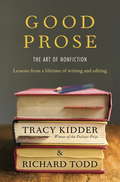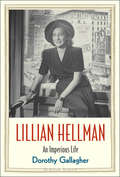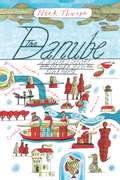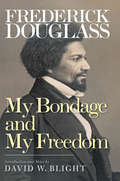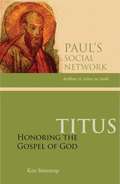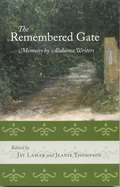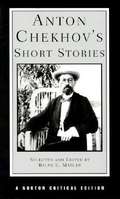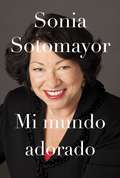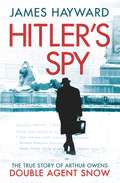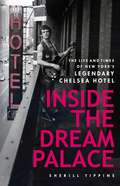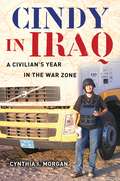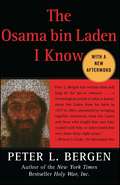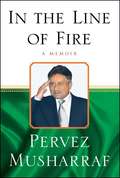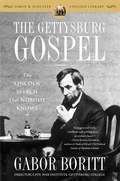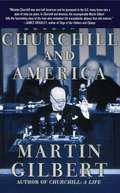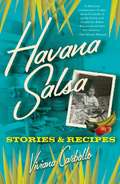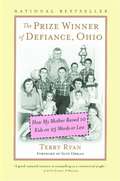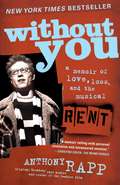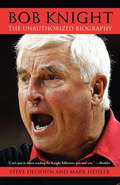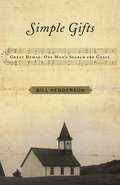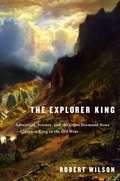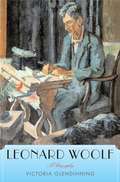- Table View
- List View
Good Prose
by Richard Todd Tracy KidderGood Prose is an inspiring book about writing--about the creation of good prose--and the record of a warm and productive literary friendship. The story begins in 1973, in the offices of The Atlantic Monthly, in Boston, where a young freelance writer named Tracy Kidder came looking for an assignment. Richard Todd was the editor who encouraged him. From that article grew a lifelong association. Before long, Kidder's The Soul of a New Machine, the first book the two worked on together, had won the Pulitzer Prize. It was a heady moment, but for Kidder and Todd it was only the beginning of an education in the art of nonfiction. Good Prose explores three major nonfiction forms: narratives, essays, and memoirs. Kidder and Todd draw candidly, sometimes comically, on their own experience--their mistakes as well as accomplishments--to demonstrate the pragmatic ways in which creative problems get solved. They also turn to the works of a wide range of writers, novelists as well as nonfiction writers, for models and instruction. They talk about narrative strategies (and about how to find a story, sometimes in surprising places), about the ethical challenges of nonfiction, and about the realities of making a living as a writer. They offer some tart and emphatic opinions on the current state of language. And they take a clear stand against playing loose with the facts. Their advice is always grounded in the practical world of writing and publishing. Good Prose--like Strunk and White's The Elements of Style--is a succinct, authoritative, and entertaining arbiter of standards in contemporary writing, offering guidance for the professional writer and the beginner alike. This wise and useful book is the perfect companion for anyone who loves to read good books and longs to write one.Praise for Good Prose "Good Prose: The Art of Nonfiction takes us into the back room behind the shop, where strong, effective, even beautiful sentences are crafted. Tracy Kidder and his longtime editor, Richard Todd, offer lots of useful advice, and, still more, they offer insight into the painstaking collaboration, thoughtfulness, and hard work that create the masterful illusion of effortless clarity."--Stephen Greenblatt, author of The Swerve: How the World Became Modern"Good Prose offers consummate guidance from one of our finest writers and his longtime editor. Explaining that 'the techniques of fiction never belonged exclusively to fiction,' Kidder and Todd make a persuasive case that 'no techniques of storytelling are prohibited to the nonfiction writer, only the attempt to pass off invention as facts.' Writers of all stripes, from fledgling journalists to essayists of the highest rank, stand to benefit from this engrossing manual."--Jon Krakauer, author of Into the Wild "What a pleasure to read a book about good prose written in such good prose! It will make many of its readers better writers (though none as good as Tracy Kidder, who sets an impossible standard), and it will make all of them wish they could hire Richard Todd to work his editorial magic on their words."--Anne Fadiman, author of The Spirit Catches You and You Fall Down
Lillian Hellman
by Dorothy GallagherGlamorous, talented, audacious--Lillian Hellman knew everyone, did everything, had been everywhere. By the age of twenty-nine she had written The Children’s Hour, the first of four hit Broadway plays, and soon she was considered a member of America’s first rank of dramatists, a position she maintained for more than twenty-five years. Apart from her literary accomplishments--eight original plays and three volumes of memoirs--Hellman lived a rich life filled with notable friendships, controversial political activity, travel, and love affairs, most importantly with Dashiell Hammett. But by the time she died, the truth about her life and works had been called into question. Scandals attached to her name, having to do with sex, with money, and with her own veracity. Dorothy Gallagher confronts the conundrum that was Lillian Hellman--a woman with a capacity to inspire outrage as often as admiration. Exploring Hellman’s leftist politics, her Jewish and Southern background, and her famous testimony before the House Un-American Activities Committee, Gallagher also undertakes a new reading of Hellman’s carefully crafted memoirs and plays, in which she is both revealed and hidden. Gallagher sorts through the facts and the myths, arriving at a sharply drawn portrait of a woman who lived large to the end of her remarkable life and never backed down from a fight.
The Danube
by Nick Thorpehopkeepers, beekeepers, waitresses, smugglers and border policemen, legal and illegal immigrants, and many more. For readers who anticipate their own journeys on the Danube, as well as those who only dream of seeing the great river, this book will be a unique and treasured guide.
My Bondage and My Freedom
by David W. Blight Frederick DouglassBorn into slavery in 1818, Frederick Douglass escaped to freedom and became a passionate advocate for abolition and social change and the foremost spokesperson for the nation’s enslaved African American population in the years preceding the Civil War. My Bondage and My Freedom is Douglass’s masterful recounting of his remarkable life and a fiery condemnation of a political and social system that would reduce people to property and keep an entire race in chains. This classic is revisited with a new introduction and annotations by celebrated Douglass scholar David W. Blight. Blight situates the book within the politics of the 1850s and illuminates how My Bondage represents Douglass as a mature, confident, powerful writer who crafted some of the most unforgettable metaphors of slavery and freedom—indeed of basic human universal aspirations for freedom—anywhere in the English language.
Titus: Brothers And Sisters In Faith)
by Ken StenstrupHuman beings are embedded in a set of social relations. A social network is one way of conceiving that set of relations in terms of a number of persons connected to one another by varying degrees of relatedness. In the early Jesus group documents featuring Paul and coworkers, it takes little effort to envision the apostle's collection of friends and friends of friends that is the Pauline network. The persons who constituted that network are the focus of this set of books. For Christians of the Western tradition, these persons are significant ancestors in faith. While each of them is worth knowing by themselves, it is largely because of their standing within that web of social relations woven about and around Paul that they are of lasting interest. Through this series we hope to come to know those persons in ways befitting their first-century Mediterranean culture. Paul's network is a complex collection of people, many of whom receive only the slightest acknowledgment in the New Testament. While Titus receives more than a cursory mention, the writings that include him come from different generations of Jesus followers. In "Titus: Honoring the Gospel of God, " Ken Stenstrup makes the distinction between these generations of writings and, by employing social-scientific methods, uses Titus to shed light on Paul as a change agent and leader. As one of Paul's coworkers, Titus provided stability and guidance to early Jesus groups. He was welcomed by these groups and reported their hospitality to Paul. Stenstrup emphasizes the collectivistic culture of the first century and explains how this influenced the relationships between Paul, Titus, and the early Jesus groups. "Ken Stenstrup teaches a variety of introductory level Scripture courses at Saint Mary's University of Minnesota. For several years he has been a member of the Social Sciences and New Testament Interpretation task force of the Catholic Biblical Association. "
The Remembered Gate: Memoirs by Alabama Writers
by Jay Lamar Jeanie ThompsonA collection of essays from 19 nationally known writers from Alabama, reflecting on artistic self-discovery and regional awareness.
Theoderic and the Roman Imperial Restoration
by Jonathan J. ArnoldThis book provides a new interpretation of the fall of the Roman Empire and the barbarian kingdom known conventionally as Ostrogothic Italy. Relying primarily on Italian textual and material evidence, and in particular the works of Cassiodorus and Ennodius, Jonathan J. Arnold argues that contemporary Italo-Romans viewed the Ostrogothic kingdom as the Western Roman Empire and its barbarian king, Theoderic (r. 489/93 526), as its emperor. Investigating conceptions of Romanness, Arnold explains how the Roman past, both immediate and distant, allowed Theoderic and his Goths to find acceptance in Italy as Romans, with roles essential to the Empire's perceived recovery. Theoderic and the Roman Imperial Restoration demonstrates how Theoderic's careful attention to imperial traditions, good governance, and reconquest followed by the re-Romanization of lost imperial territories contributed to contemporary sentiments of imperial resurgence and a golden age. There was no need for Justinian to restore the Western Empire: Theoderic had already done so.
Eminent Economists II
by Michael Szenberg Lall B. RamrattanThe sequel to Eminent Economists, this book presents the ideas of some of the most outstanding economists of the past half century. The contributors, representing divergent points of the ideological compass, present their life philosophies and reflect on their conceptions of human nature, society, justice, and the source of creative impulse. These self-portraits reveal details of the economists' personal and professional lives that capture the significance of the total person. The essays represent streams of thought that lead to the vast ocean of economics, where gems of the discipline lie, and the volume will appeal to a wide array of readers, including professional economists, students, and laypersons who seek a window into the heart of this complex field. The contributors include Alan S. Blinder, Clair Brown, John Y. Campbell, Vincent P. Crawford, Paul Davidson, Angus Deaton, Harold Demsetz, Peter Diamond, Avinash Dixit, Barry Eichengreen, Jeffrey Frankel, Richard B. Freeman, Benjamin M. Friedman, John Hull, Michael D. Intriligator, Peter B. Kenen, Anne O. Krueger, Helen F. Ladd, Harry M. Markowitz, Frederic S. Mishkin, Elinor Ostrom, Anwar Shaikh, Jeremy J. Siegel, Vernon L. Smith, Robert M. Stern, Myra H. Strober, Hal R. Varian, Michelle J. White, and Marina V. N. Whitman.
Anton Chekhov's Short Stories
by Anton Chekhov Ralph E. MatlawA selection that gives the general picture of Chekhov's work that reflects his major concerns, techniques, and attitudes, and includes most of his best and most popular stories, selections from Chekhov's Letters and criticism.
Mi mundo adorado
by Sonia SotomayorLa primera latina y tan sólo la tercera mujer designada a la Corte Suprema de los Estados Unidos, Sonia Sotomayor se ha convertido en un icono americano contemporáneo. Ahora, con un candor e intimidad nunca antes asumidos por un juez en activo, Sonia nos narra el viaje de su vida --desde los proyectos del Bronx hasta la corte federal-- en una inspiradora celebración de su extraordinaria determinación y del poder de creer en uno mismo. Esta es la historia de una niñez precaria, con un padre alcohólico que moriría cuando ella tenía nueve años y una madre devota pero sobrecargada, y del refugio que una niña tomó de la confusión del hogar con su apasionada y enérgica abuela. Pero no fue hasta que le diagnosticaron diabetes juvenil que la precoz Sonia reconoció que, en última instancia, dependía de sí misma. Pronto aprendería a darse a sí misma las inyecciones de insulina necesarias para sobrevivir y a rápidamente forjar un camino hacia una vida mejor. Con personajes de televisión como modelo y poca idea sobre lo que en realidad implicaba, Sonia decidió ser abogada, un sueño que la sostendría en su improbable recorrido, desde su brillante paso por la escuela secundaria, la universidad de Princeton y la escuela de Derecho de Yale hasta la fiscalía de distrito del Condado de Nueva York, la práctica privada, y el nombramiento a la Corte Federal de Distrito, todo antes de llegar a los cuarenta años. A lo largo del camino vemos como Sonia fue formada por diversas experiencias (como su fallido matrimonio), mentores invaluables, y la versión moderna de familia que creó con amigos queridos y sus hijos. A través de sus aún asombrados ojos, las posibilidades infinitas de los Estados Unidos son vislumbradas nuevamente en este libro cálido y honesto, destinado a convertirse en un clásico de la autoformación y el autodescubrimiento.
Hitler's Spy
by James HaywardOriginally published as Double Agent Snow, Hitler's Spy is the paperback edition, which tells of how on the eve of the outbreak of the Second World War the double-agent Arthur Owens, codenamed SNOW, is summoned to Berlin and appointed Hitler's chief spy in Britain. Days later he finds himself in Wandsworth prison, betrayed by the wife he traded for a younger model, and forced to transmit false wireless messages for MI5 to earn his freedom - and avoid the hangman's noose. A vain and devious anti-hero with no moral compass, Owen's motives were status, money and women. He mixed fact with fiction constantly, and at times insisted that he was a true patriot, undertaking hazardous secret missions for his mother country; at other times, Owens saw himself as a daring rogue agent, outwitting British Intelligence and loyal only to the Fatherland. Yet in 1944, as Allied troops stormed the beaches of Normandy on D-Day, Hitler was caught unawares, tricked into expecting the invasion across the Pas de Calais in a strategic deception played out by Owens and the double-cross agents of MI5. For all his flaws, Agent Snow became the traitor who saved his country. Based on recently de-classified MI5 files and previously unpublished sources, Hitler's Spy is the story of a secret Battle of Britain, fought by Snow and his opposing spymasters, Thomas 'Tar' Robertson of MI5 and Nikolaus Ritter of the Abwehr, as well as the tragic love triangle between Owens, his wife Irene, and his mistress Lily Funnell. The evocative, fast-paced narrative moves from seedy south London pubs to North Sea trawlers, from chic Baltic spa resorts to Dartmoor gaol, populated by a colourful rogue's gallery of double-cross agents.
Inside the Dream Palace
by Sherill TippinsThe Chelsea Hotel, since its founding by a visionary French architect in 1884, has been an icon of American invention: a cultural dynamo and haven for the counterculture, all in one astonishing building. Sherill Tippins, author of the acclaimed February House, delivers a masterful and endlessly entertaining history of the Chelsea and of the successive generations of artists who have cohabited and created there, among them Thomas Wolfe, Dylan Thomas, Arthur Miller, Allen Ginsberg, Bob Dylan, Janis Joplin, Leonard Cohen, Patti Smith, Robert Mapplethorpe, Andy Warhol, Sam Shepard, Sid Vicious, and Dee Dee Ramone. Now as legendary as the artists it has housed and the countless creative collaborations it has sparked, the Chelsea has always stood as a mystery as well: why and how did this hotel become the largest and longest-lived artists' community in the known world? Inside the Dream Palace is the intimate and definitive story.
Stefan Wolpe and the Avant-Garde Diaspora
by Brigid CohenThe German-Jewish emigre composer Stefan Wolpe was a vital figure in the history of modernism, with affiliations ranging from the Bauhaus, Berlin agitprop and the kibbutz movement to bebop, Abstract Expressionism and Black Mountain College. This is the first full-length study of this often overlooked composer, launched from the standpoint of the mass migrations that have defined recent times. Drawing on over 2000 pages of unpublished documents, Cohen explores how avant-garde communities across three continents adapted to situations of extreme cultural and physical dislocation. A conjurer of unexpected cultural connections, Wolpe serves as an entry-point to the utopian art worlds of Weimar-era Germany, pacifist movements in 1930s Palestine and vibrant art and music scenes in early Cold War America. The book takes advantage of Wolpe's role as a mediator, bringing together perspectives from music scholarship, art history, comparative literature, postcolonial studies and recent theories of cosmopolitanism and diaspora.
Cindy in Iraq
by Cynthia I. MorganCindy in Iraq is Cynthia Morgan's hair-raising yet jubilant chronicle of her perilous year in war-torn Iraq as a truck driver -- the most dangerous civilian job in the war zone. In the summer of 2003, a friend in the National Guard stationed in Iraq wrote to Morgan about KBR, a Halliburton subsidiary that was hiring drivers. Morgan was from a family with a long military history; her oldest son was in the National Guard at the time. Wanting to do her part for her country and struggling financially after leaving her abusive third husband, Cindy decided she was "tired of surviving her life and not living it." She left everything and everyone behind and set out for Kuwait and Iraq to be a truck driver for KBR. She felt Iraq would give her the opportunity she needed to make some changes in her life. Her three sons, then ages 18, 16, and 15, along with the rest of her family, supported her decision, but made her promise that she would always tell them the truth about what she was going through as a driver in Iraq. Drawn in part from the emails she posted home and the journals she kept, Cindy in Iraq re-creates in vivid detail how Morgan overcame the stigma of being one of the rare female truck drivers and quickly rose through the ranks to become a convoy commander. She led her fellow Reefer Cowboys -- "reefer" is short for "refrigerated truck" -- in convoys that delivered necessary goods to soldiers stationed in such notorious hot spots as Baghdad Airport, Camp Anaconda -- a place as dangerous as its name -- and Fallujah. A moving target for insurgents and with virtually no training, and unarmed as well, she faced being ambushed and shot at, all while learning how to navigate Iraq's difficult terrain. As the insurgency heated up, contractors were in more and more peril, increasingly kidnapped and executed. By the time Cindy's year in Iraq was up, she had shrapnel in her arm. She also discovered that there are times when the enemy can be someone you know. Cindy's journey to Iraq was also a voyage of self-discovery: "I knew that I would find out who I am and what I am made of here.... Honor, integrity, pride, and humanity can all be discovered. I know that I still am a very passionate person when it comes to the things I believe in.... I am still me, but more.... So my story of being over here is not just one of a female truck driver driving in a war zone in Iraq. It is a story of me finding the world, and of me finding me." Cindy's is an eyewitness account of war that few journalists can offer: The grateful Iraqi children, the hardworking U.S. soldiers, and the personal stories of soldiers and civilians alike thrown together in a war unlike any other the United States has ever fought.
The Osama bin Laden I Know
by Peter BergenThe Osama bin Laden I Know is an unprecedented oral history of Osama bin Laden's rise to revered leader of al Qaeda. Peter Bergen takes the reader onto the battlefields of Afghanistan as bin Laden goes from a shy, quiet teen to a leader; he brings you into Osama's intimate family life as he lives under the radar in Sudan, then Afghanistan; he puts you right in the room for al Qaeda's very first meeting; and he uses eyewitness accounts to relate what bin Laden said, and thought on 9/11 as he watched the twin towers fall. Derived from Bergen's interviews with more than 50 people who know bin Laden personally, from his highschool teacher to an early al Qaeda member who later became a US informant, The Osama bin Laden I Know recounts individual experiences with the man who has declared the US, and its allies, his greatest enemies.
In the Line of Fire
by Pervez MusharrafAccording to Time magazine, Pakistan's President Pervez Musharraf holds "the world's most dangerous job." He has twice come within inches of assassination. His forces have caught more than 670 members of al Qaeda in the mountains and cities, yet many others remain at large and active, including Osama bin Laden and Ayman Al Zawahiri. Long locked in a deadly embrace with its nuclear neighbor India, Pakistan has come close to full-scale war on two occasions since it first exploded a nuclear bomb in 1998. As President Musharraf struggles for the security and political future of his nation, the stakes could not be higher for the world at large. It is unprecedented for a sitting head of state to write a memoir as revelatory, detailed, and gripping as In the Line of Fire. Here, for the first time, readers can get a firsthand view of the war on terror in its central theater. President Musharraf details the manhunts for Osama and Zawahiri and their top lieutenants, complete with harrowing cat-and-mouse games, informants, interceptions, and bloody firefights. He tells the stories of the near-miss assassination attempts, not only against himself but against Shaukut Aziz (later elected prime minister) and one of his top army officers (later the vice chief of army staff), and of the abduction and beheading of Daniel Pearl -- as well as the forensic and shoe-leather investigations that uncovered the perpetrators. He details the army's mountain operations that have swept several valleys clean, and he talks about the areas of North Waziristan where al Qaeda is still operating. Yet the war on terror is just one of the many headline-making subjects in In the Line of Fire. The full story of the events that brought President Musharraf to power in 1999 is told for the first time. He reveals new details of the 1999 confrontation with India in Kashmir (the Kargil conflict) and offers a proposal for resolving the Kashmir dispute. He offers a portrait of Mullah Omar, with stories of Pakistan's attempts to negotiate with him. Concerning A. Q. Khan and his proliferation network, he explains what the government knew and when it knew it, and he reveals fascinating details of Khan's operations and the investigations into them. In addition, President Musharraf takes many stances that will make news. He calls for the Muslim world to recognize Israel once a viable Palestinian state is created. He urges the repeal of Pakistan's 1979 Hudood law. He calls for the emancipation of women and for their full political equality with men. He tells the sad story of Pakistan's experience with democracy and what he has done to make it workable.
The Gettysburg Gospel: The Lincoln Speech That Nobody Knows
by Gabor BorittThe words Abraham Lincoln spoke at the dedication of the Soldiers' National Cemetery at Gettysburg comprise perhaps the most famous speech in history. It has been quoted by popes, presidents, prime ministers, and revolutionaries around the world. From "Four score and seven years ago. . . " to "government of the people, by the people, for the people," Lincoln's words echo in the American conscience. Many books have been written about the Gettysburg Address and yet, as Lincoln scholar Gabor Boritt shows, there is much that we don't know about the speech. In The Gettysburg Gospel he reconstructs what really happened in Gettysburg, Pennsylvania, on November 19, 1863. Boritt tears away a century of myths, lies, and legends to give us a clear understanding of the greatest American's greatest speech. In the aftermath of the bloodiest battle ever fought in North America, the little town of Gettysburg was engulfed in the worst man-made disaster in U. S. history: close to 21,000 wounded; very few doctors; heroic women coping in houses, barns, and churches turned into hospitals; dead horses and mules rotting in farmyards and fields; and at least 7,000 dead soldiers who had to be dug up, identified, and reburied. This was where Lincoln had to come to explain why the horror of war must continue. Planning America's first national cemetery revitalized the traumatized people of Gettysburg, but the dedication ceremonies overwhelmed the town. Lincoln was not certain until the last moment whether he could come. But he knew the significance of the occasion and wrote his remarks with care -- the first speech since his inauguration that he prepared before delivering it. A careful analysis of the Address and the public reaction to it form the center of this book. Boritt shows how Lincoln responded to the politics of the time and also clarifies which text he spoke from and how and when he wrote the various versions. Few people initially recognized the importance of the speech; it was frequently and, at times, hilariously misreported. But over the years the speech would grow into American scripture. It would acquire new and broader meanings. It would be better understood, but also misunderstood and misinterpreted to suit beliefs very different from Lincoln's. The Gettysburg Gospel is based on years of scholarship as well as a deep understanding of Lincoln and of Gettysburg itself. It draws on vital documents essential to appreciating Lincoln's great speech and its evolution into American gospel. This is an indispensable book for anyone interested in the Gettysburg Address, Abraham Lincoln, the Civil War, or American history.
Churchill and America
by Martin GilbertGilbert (Winston Churchill's official biographer) examines former British Prime Minister Winston Churchill's experiences in the United States and relationships with Americans during war and peace. Churchill's many trips to the US are documented, from his first visit to New York to his final visit in 1961. His relationships with Americans include his political relations with presidents and generals. While the ostensible topic is Churchill's attitudes towards the United States, an obvious subtext is the development of the Anglo- American "special relationship" during two World Wars and the early years of the Cold War. Annotation ©2006 Book News, Inc. , Portland, OR (booknews. com)
Havana Salsa
by Viviana CarballoWith more than seventy mouthwatering recipes, this vibrant memoir by food writer Viviana Carballo shares the Havana of her childhood -- warm nights, pounding surf, energetic music, and the memorable meals that both nourished and delighted her and her family throughout the years. In the 1940s and 1950s, at the height of government corruption, Havana was a nonstop party. Food and music defined the culture, and the pervading sensuality -- the physical beauty of the city itself with its frisson of danger -- made it a magnet for tourists, gangsters, and the world's most glamorous celebrities. This was the Cuba of Viviana Carballo's magical childhood and adventurous adolescence. Born in 1939, she was the only child of a stylish and spirited woman and a handsome astrologer and writer, whose passion for food ignited Carballo's own taste for the exotic, eclectic cuisine for which Havana had become known. By the time she reached her teenage years, sultry nights dancing at the Tropicana and rubbing elbows with the likes of Ernest Hemingway, Meyer Lansky, and Guillermo Cabrera Infante nourished her hunger for the rhythm and creativity pulsating throughout her beloved city. But all of that changed in 1959, when Fidel Castro took command of this rollicking paradise, turning it into a country marked by extreme poverty, food shortages, power outages, and daily water stoppages. In 1961, Carballo left her beloved country with the clothes on her back and no idea when she would ever see her husband, family, or friends again. It is only through her memories that she has ever returned to the place that defined her. Havana Salsa is a collection of stories about her large, extended family, a rather eccentric group who conducted their lives against the extraordinary backdrop of Havana, and of her own experiences amid the city's former delicious decadence. It also showcases the food and recipes Carballo associates with each delightful family memory, beginning with her childhood in the forties (calabaza fritters, sweet plantain tortillas, and oxtail stew), through the sensual fifties (roast shoulder of lamb, Cuban bouillabaisse), and then the first eighteen months of Castro's revolution (mango pie, pollito en cazuela, and papas with chorizo). Havana Salsa tells the history of Carballo's Havana as only she can -- through the intimate and unifying experience of food, family, and friends.
The Prize Winner of Defiance, Ohio
by Suze Orman Terry RyanThe Prize Winner of Defiance, Ohio introduces Evelyn Ryan, an enterprising woman who kept poverty at bay with wit, poetry, and perfect prose during the "contest era" of the 1950s and 1960s. Stepping back into a time when fledgling advertising agencies were active partners with consumers, and everyday people saw possibility in every coupon, Terry Ryan tells how her mother kept the family afloat by writing jingles and contest entries. Mom's winning ways defied the Church, her alcoholic husband, and antiquated views of housewives. To her, flouting convention was a small price to pay when it came to securing a happy home for her six sons and four daughters. Evelyn, who would surely be a Madison Avenue executive if she were working today, composed her jingles not in the boardroom, but at the ironing board. By entering contests wherever she found them -- TV, radio, newspapers, direct-mail ads -- Evelyn Ryan was able to win every appliance her family ever owned, not to mention cars, television sets, bicycles, watches, a jukebox, and even trips to New York, Dallas, and Switzerland. But it wasn't just the winning that was miraculous; it was the timing. If a toaster died, one was sure to arrive in the mail from a forgotten contest. Days after the bank called in the second mortgage on the house, a call came from the Dr Pepper company: Evelyn was the grand-prize winner in its national contest -- and had won enough to pay the bank. Graced with a rare appreciation for life's inherent hilarity, Evelyn turned every financial challenge into an opportunity for fun and profit. From her frenetic supermarket shopping spree -- worth $3,000 today -- to her clever entries worthy of Erma Bombeck, Dorothy Parker, and Ogden Nash, the story of this irrepressible woman whose talents reached far beyond her formidable verbal skills is told in The Prize Winner of Defiance, Ohio with an infectious joy that shows how a winning spirit will triumph over the poverty of circumstance.
Without You: A Memoir of Love, Loss, and the Musical Rent
by Anthony RappAnthony Rapp captures the passion and grit unique to the theatre world as he recounts his life-changing experience in the original cast of the Pulitzer Prize-winning musical Rent. Anthony had a special feeling about Jonathan Larson's rock musical from his first audition, so he was thrilled when he landed a starring role as the filmmaker Mark Cohen. With his mom's cancer in remission and a reason to quit his newly acquired job at Starbucks, his life was looking up. When Rent opened to thunderous acclaim off Broadway, Rapp and his fellow cast members knew that something truly extraordinary had taken shape. But even as friends and family were celebrating the show's success, they were also mourning Jonathan Larson's sudden death from an aortic aneurysm. By the time Rent made its triumphant jump to Broadway, Larson had posthumously won the 1996 Pulitzer Prize. When Anthony's mom began to lose her battle with cancer, he struggled to balance the demands of life in the theatre with his responsibility to his family. Here, Anthony recounts the show's magnificent success and his overwhelming loss. He also shares his first experiences discovering his sexuality, the tension it created with his mother, and his struggle into adulthood to gain her acceptance. Variously marked by fledgling love and devastating loss, piercing frustration and powerful enlightenment, Without You charts the course of Rapp's exhilarating journey with the cast and crew of Rent as well as the intimacies of his personal life behind the curtain.
Bob Knight
by Steve Delsohn Mark HeislerBrilliant, intimidating, charming, or profane, Coach Bob Knight is an enduring contradiction who has long fascinated and repelled basketball fans, for whom he has provided as much to dislike as to respect. Bob Knight: The Unauthorized Biography is the first comprehensive biography of Knight, one of the most successful and controversial coaches in the history of American sports. Detailing the entire scope of Knight's playing and coaching career through extensive interviews -- including many with people who have never gone on record about him before -- authors Steve Delsohn and Mark Heisler give a candid yet balanced account of the man who will likely end up as the all-time winningest coach in college basketball. In 1965, at age twenty-four, Bobby Knight became the head basketball coach at Army and began a career that would soon take him to Indiana University, where for the next twenty-nine years he would become the game's most famous and notorious coach. While there, he won three national championships (1976, '81, '87) and once compiled a perfect 32-0 record with an amazing 63-1 record over two seasons. Knight was NCAA Coach of the Year three times (1975, '76, '89) and coached U.S. teams to gold medals in both the Olympics and the Pan-Am Games. Yet he is equally, if not more, famous for some of his misbehaviors -- pulling his team off the court against the Soviets, making insensitive comments about rape to Connie Chung, putting a tampon in a player's locker to let him know that Knight thought he was a wimp -- and other alleged misbehaviors: kicking his own son Patrick during a game, stuffing an LSU fan into a trash can, assaulting a policeman in Puerto Rico -- and the list goes on. One of Knight's closest friends once said of him, "Bob Knight is an asshole. But he knows it and he tries like hell to make up for it." Unfortunately, over the years there has been more and more to make up for. The story of Bob Knight has moved on to Texas Tech, where he continues his quest to become the winningest college basketball coach of all time. He already is the most fascinating. Love him or loathe him, Knight keeps winning and forces you to watch him and have an opinion. Bob Knight: The Unauthorized Biography is an extraordinary look at a legendary coach with a monumental temper and an appetite for confrontation.
Simple Gifts: One Man's Search for Grace
by Bill HendersonIf there is one simple phrase that lies at the heart of this moving tribute to the pleasures of singing hymns, it is this: "Only joy." Bill Henderson, a tough man with a gentle vision, found community and religious grace as a middle-aged man while lifting his voice in church. In a book that will inspire readers to share his passion, he writes of his love of traditional hymns and how he sought to learn about their origins. This is a much-needed book about the songs of our lives and will be warmly welcomed by thoughtful people of many faiths, especially those who reject the narrow orthodoxies of religious fundamentalism. For Bill Henderson, the researching of his favorite hymns became more than fact-finding. As the author went about his research, he learned that he had cancer. Someone slipped a note into his typewriter: "Only Joy," it read. He adopted that phrase as a motto for writing and for life. While Simple Gifts is partly a memoir, it is a work not about one man's health but about his pursuit of godliness. That the joy of congregational song aided Henderson in his recovery he has no doubt, but he offers a wider vision, one that is truly life-enhancing. Bill Henderson grew up attending a Presbyterian church in Philadelphia with his quietly religious family. He left his faith as he became a teenager and didn't rediscover it until many decades later. What brought him back to church was the sheer pleasure he found in singing old familiar hymns with others. Some of these hymns moved him to tears, and so he decided to immerse himself in the history of Christian music. With three themes under consideration -- Songs of Simplicity, of Wonder, and of Love -- the author begins with a look back at plain chant; the songs of Martin Luther, Isaac Watts, Charles Wesley, and others; and the emergence of modern church music. "Simple Gifts," the great Shaker hymn, opens the Songs of Simplicity section, which includes "In the Garden" as well as many Christmas carols like "O Holy Night" and Christina Rossetti's "In the Bleak Midwinter. "The amazing story behind "Amazing Grace" leads into the Songs of Wonder chapter. Also appreciated here are "Be Thou My Vision" and "How Great Thou Art." With the Prayer of St. Francis as a pretext, Henderson discusses Songs of Love: "Make Me a Channel of Your Peace," "There Is a Balm in Gilead," and "Abide With Me." Henderson believes that many of these old hymns are in danger of being forgotten as "modern" churches have adopted rock-based music or watered-down, politically correct verses. More important, he meditates on the hymns' values as he tries to understand his own relationship with God, even as they inspired him through his bout with a life-threatening illness. While this book celebrates mainstream Protestant hymns, it is by no means sectarian. It is about songs of the heart, songs that move us, the songs of our lives. It is about joy.
The Explorer King
by Robert WilsonIn this, one of the year's most compelling biographies, Robert Wilson paints a brilliant portrait of Clarence King -- a scientist-explorer whose mountain-scaling, desert-crossing, river-fording, blizzard-surviving adventures helped create the new West of the nineteenth century. A sort of Howard Hughes of the 1800s, Clarence King in his youth was an icon of the new America: a man of both action and intellect, who combined science and adventure with romanticism and charm. The Explorer King vividly depicts King's amazing feats and also uncovers the reasons for the shocking decline he suffered after his days on the American frontier. The Yale-educated King went west in 1863 at age twenty-one as a geologist-explorer. During the next decade he scaled the highest peaks of the Sierra Nevada, published a popular book now considered a classic of adventure literature, initiated a groundbreaking land survey of the American West, and ultimately uncovered one of the greatest frauds of the century -- the Great Diamond Hoax, a discovery that made him an international celebrity at a time when they were few and far between. Through King's own rollicking tales, some true, some embroidered, of scaling previously unclimbed mountain peaks, of surviving a monster blizzard near Yosemite, of escaping ambush and capture by Indians, of being chased on horseback for two days by angry bandits, Robert Wilson offers a powerful combination of adventure, history, and nature writing. He also provides the bigger picture of the West at this time, showing the ways in which the terrain of the western United States was measured and charted and mastered, and how science, politics, and business began to intersect and influence one another during this era. Ultimately, King himself would come to symbolize the collision of science and business, possibly the source of his downfall. Fascinating and extensive, The Explorer King movingly portrays the America of the nineteenth century and the man who -- for better or worse -- typified the soul of the era.
Leonard Woolf: A Biography
by Victoria GlendinningAward-winning biographer Victoria Glendinning draws on her deep knowledge of the twentieth century literary scene, and on her meticulous research into previously untapped sources, to write the first full biography of the extraordinary man who was the "dark star" at the center of the Bloomsbury set, and the definitive portrait of the Woolf marriage. A man of extremes, Leonard Woolf was ferocious and tender, violent and self-restrained, opinionated and nonjudgmental, always an outsider of sorts within the exceptionally intimate, fractious, and sometimes vicious society of brilliant but troubled friends and lovers. He has been portrayed either as Virginia's saintly caretaker or as her oppressor, the substantial range and influence of his own achievements overshadowed by Virginia's fame and the tragedy of her suicide. But Leonard was a pivotal figure of his age, whose fierce intelligence touched the key literary and political events that shaped the early decades of the twentieth century and would resonate into the post-World War II era. Glendinning beautifully evokes Woolf 's coming-of-age in turn-of-the-century London. The scholarship boy from a prosperous Jewish family would cut his own path through the world of the British public school, contending with the lingering anti-Semitism of Imperial Age Britain. Immediately upon entering Trinity College, Cambridge, Woolf became one of an intimate group of vivid personalities who would form the core of the Bloomsbury circle: the flamboyant Lytton Strachey; Toby Stephen, "the Goth," through whom Leonard would meet Stephen's sister Virginia; and Clive Bell. Glendinning brings to life their long nights of intense discussion of literature and the vicissitudes of sex, and charts Leonard's course as he becomes the lifelong friend of John Maynard Keynes and E. M. Forster. She unearths the crucial influence of Woolf 's seven years as a headstrong administrator in colonial Ceylon, where he lost confidence in the imperial mission, deciding to abandon Ceylon in order to marry the psychologically troubled Virginia Stephen. Glendinning limns the true nature of Leonard's devotion to Virginia, revealing through vivid depiction of their unconventional marriage how Leonard supported Virginia through her breakdowns and in her writing. In co-founding with Virginia the Hogarth Press, he provided a secure publisher for Virginia's own boldly experimental works. As the éminence grise of the early Labour Party, working behind the scenes,Woolf became a leading critic of imperialism, and his passionate advocacy of collective security to prevent war underpinned the charter of the League of Nations. After Virginia's death, he continued to forge his own iconoclastic way, engaging in a long and happy relationship with a married woman. Victoria Glendinning'sLeonard Woolfis a major achievement -- a shrewdly perceptive and lively portrait of a complex man of extremes and contradictions in whom passion fought with reason and whose far-reaching influence is long overdue for the full appreciation Glendinning offers in this important book.
